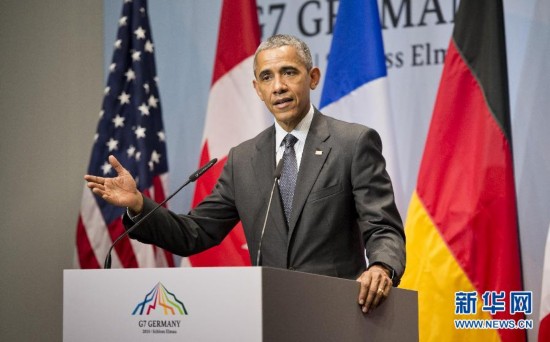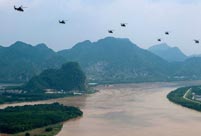

 |
| (Photo/Xinhua) |
BEIJING, June 9 -- By devoting part of a summit declaration to alleged tensions on the East and South China Seas, the Group of Seven (G7) is actually seeking to reinforce its waning influence on the world stage, experts said.
The paragraphs on the East and South China Seas came as a result of forceful push by Japan and the United States, both of which want to use occasions such as the G7 summit to exert pressure on China, said Ruan Zongze, vice president of China Institute of International Studies.
Members of the G7 countries are all developed economies but their influence in the economic arena has been on the decline, and by voicing "concern" over the South China Sea, the group intends to lift its global profile, Ruan added.
The G7 said in the declaration that it opposes "any unilateral actions that seek to change the status quo" on the East and South China Seas.
The position could be viewed as targeting China, but it could also be against Japan and the United States," said Gu Xuewu, director of Center for Global Studies at the University of Bonn.
Japan's move to "nationalize" the Diaoyu Islands and the United States' planned deployment of warships in areas within 12 nautical miles from islands claimed by China are both unilateral actions, Gu said.
 School life of students in a military college
School life of students in a military college PLA soldiers operate antiaircraft guns in drill
PLA soldiers operate antiaircraft guns in drill Mysterious “sky road” in Mount Dawagengzha
Mysterious “sky road” in Mount Dawagengzha J-11 fighters in air exercise
J-11 fighters in air exercise Top 16 Chinese cities with the best air quality in 2014
Top 16 Chinese cities with the best air quality in 2014 PLA helicopters travel 2,000 kilometers in maneuver drill
PLA helicopters travel 2,000 kilometers in maneuver drill PLA soldiers conduct 10-kilometer long range raid
PLA soldiers conduct 10-kilometer long range raid Stars who aced national exams
Stars who aced national exams
 Hefei-Fuzhou railway line put into trial operation
Hefei-Fuzhou railway line put into trial operation Pain lingers as nation mourns lost lives
Pain lingers as nation mourns lost lives The social media breakup
The social media breakup Parents willing to pay millions for substitute gaokao takers
Parents willing to pay millions for substitute gaokao takers Mind the gaps: Post-70, 80 and 90 generations
Mind the gaps: Post-70, 80 and 90 generationsDay|Week